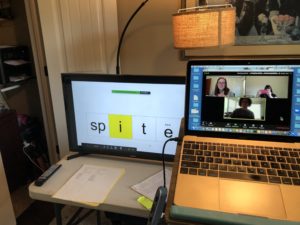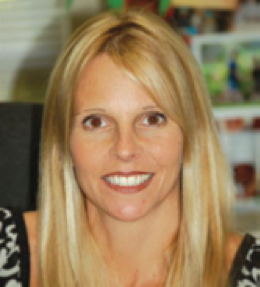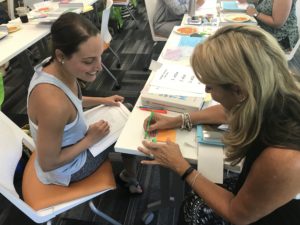A study by Ingersoll showed that the intricacy of teaching is so great that one-third of teachers leave the profession within three years and nearly half of them leave within five years. Even the most experienced teachers confront new challenges each year, including changes in standards, new instructional methods, advances in technology, changes in procedures, and a growing diversity of student learning needs.
These dynamics reinforce the need for supportive learning opportunities where teachers can collaborate and engage in dialogue with colleagues and other professionals around meaningful topics in education.
The multitude of studies conducted on the topic of teacher professional development suggests that not all learning opportunities are equal or even effective. Certain characteristics of effective professional development have been linked to long-lasting, positive outcomes for both the teachers and their students.
However, most professional development offerings do not meet the recommended criteria for effective adult learning. Research suggests that more often, organizers of professional development (Administrators, Districts) provide less in-depth opportunities that are designed to serve a large number of people within an allotted time and budget.
What teachers need is more effective, focused, and sustained professional development experiences that are selected to promote widespread and lasting changes.
Malcolm Shepard Knowles coined the term “andragogy” (similar to pedagogy), which refers to adult learning. Knowles found that adults’ experiences (positive and negative) are a strong resource for their learning and that people want to learn problem-centered information that can be applied immediately to promote positive change in their work.
When we recognize the potential outcomes of high-quality teacher professional development, the gains seem to outweigh the associated costs. Most reviews of learning outcomes will identify three primary outcomes of effective professional development:
- Teachers benefit from new knowledge and skills based on their participation
- Teachers implement what they learn to improve teaching practices, and
- Student learning and performance improves as a result of the new content learned in the professional development
These outcomes are further enhanced by specific characteristics that have been identified and documented as features that can foster successful learning.
Elements of Effective Professional Development
Content-Based
Teachers want to leave a professional development experience with a new bag of teaching “tricks.” Select learning opportunities should target explicit instruction of knowledge, skills, and strategies in the specific subject area. The overall goal of professional development is to improve and deepen the teacher’s existing content knowledge to equip him/her to apply the information to assessment, lesson planning, and differentiated instruction in daily practice. In addition, professional development opportunities that are content-based will be aligned with the standards and statewide assessments.
Relevant
Teachers are motivated to learn when the content is meaningful. Learning opportunities are best when they link to prior knowledge and are closely connected to what is needed in the classroom right now.
Teachers feel more supported and valued when professional development can be directly related to the current needs and requirements of both their students and teaching practices. Relevant learning is explicit, realistic, and challenging.
Active Learning
Teachers love to be inspired. They are instantly excited by new ideas and engaging ways to bring learning to life in the classroom. Active learning experiences provide hands-on opportunities to model and practice, review lessons, engage in planning, and observe live demonstrations or videos of actual implementation.
Multi-sensory learning activates the visual, auditory, tactile-kinesthetic modalities to keep learners engaged and appropriately challenged (Yes, it works for adults, too!). By showing and involving teachers in opportunities to apply new knowledge directly, they can experience what they are going to deliver to their students.
Teachers will benefit from professional development programs that span across days or weeks to provide multiple opportunities to process information, seek clarification, ask questions, and raise concerns with peers and an expert trainer.
Collaborative
Studies indicate that professional development is more effective in enhancing teachers’ classroom practices when it provides opportunities for collective participation between teachers, leaders, and experts.
Quality experiences promote the sharing of strategies and understandings amongst teachers in the same grade, department, and school. This leads to improved troubleshooting and a collective focus on continuous improvement. High-quality learning leaves teachers energized in their own knowledge and inspired by a community of colleagues who share their passion.
When administrators make high-quality professional development available to multiple cohorts within the school, they can expect the impact of teaching to be thoroughly evaluated. The benefits are magnified and spread. Soon, assessment teams develop, a common language is adopted, and student needs are targeted through thoughtful changes in instructional delivery.
Empowered
Teachers who engage in enthusing professional development that is directly aligned with the school’s mission and philosophy will feel a sense of urgency to support a deep integration of the new learning into practice.
Professional learning communities create opportunities for dialogue that promote inquiry, value uncertainty and build individual teacher confidence. Students notice when teachers return from high-quality experiences re-energized with new strategies, activities, and fresh ideas to enhance classroom engagement and performance.
Leaders in schools should do more than fund or provide time off to accommodate professional development. Take notice, ask questions, and provide encouragement. Upon return from effective professional development training, a teacher’s mind is bursting with knowledge, ideas, and enthusiasm to share. When not supported by administrators, teacher motivation may dwindle.
Sustainable
Rather than attending various, sporadic professional development programs in a few years time, teachers may want to consider making an ongoing commitment to a specific and deep implementation of a few focus areas over time.
Making an ongoing commitment allows educators to translate ideas into practice effectively. Each professional development experience related to a focused topic helps the teacher to build upon prior experience and knowledge, potentially gaining specialist knowledge within his/her highest interest or need areas.
Teachers who gather knowledge in concentration tend to extend their learning beyond the required professional development hours and the classroom. Sustainable learning continues across weeks, months, and years. Examples of sustained professional development include workshop/class series, practicum or internship experiences, and certification programs.
Extended Expert Support
Studies show that it takes approximately 20 trials of delivery to master a new skill.
This suggests that teachers may need ongoing, expert support and feedback that is continuous to allow time to contend with implementation challenges and troubleshoot within the classroom. Opportunities for the teacher to benefit from direct observation, constructive feedback, and assessment of fidelity by an expert can lend to improved practice, delivery, and long-term outcomes.
During this year, we have also witnessed the advantages of remote learning mentoring and the ease of connecting with professional consultants from across the country.
Summary
There is no doubt that effective professional development has important implications for improving instructional practices. When administrators include teacher choice and need in their selection of professional development offerings, the outcomes can positively change the culture of teaching in a classroom, grade, department, or in the entire school.
All in all, the most measurable and important result of effective professional development is student improvement. When teachers learn, students learn, too. Experienced, knowledgeable, and supported teachers are eager to participate in professional development programs that are invigorating and challenging.
When they return to the classroom with new “tricks” in the teaching bag, there is no stopping them. And, the best part….the students get the best teacher!
About The Author
 Dr. Kirstina Ordetx is a Level 4 Master Instructor with The Institute for Multi-Sensory Education (IMSE). She holds a doctorate in Counseling Psychology with a concentration in pediatric neurology. Dr. Ordetx is an educational specialist with over 25 years of clinical experience, research, and consultation. She is a certified Structured Literacy Dyslexia Interventionist through the Center for Effective Reading Instruction, a Certified Nutrition and Wellness Consultant, Executive Functions Coach, and a registered Licensed Mental Health Intern. Dr. Ordetx has published two books that compile her research and practice in Theory of Mind. She has served on accreditation committees for the Florida Council of Independent Schools, is a university adjunct professor in developmental and child psychology, and presents at various national and international conferences. Dr. Ordetx is head of school for a private academy in Lakewood Ranch, Florida specializing in the multi-sensory education of students who have language and learning-based differences. She is the Executive Director of the Pinnacle Pediatric Therapy Group, a multi-disciplinary, pediatric therapy clinic.
Dr. Kirstina Ordetx is a Level 4 Master Instructor with The Institute for Multi-Sensory Education (IMSE). She holds a doctorate in Counseling Psychology with a concentration in pediatric neurology. Dr. Ordetx is an educational specialist with over 25 years of clinical experience, research, and consultation. She is a certified Structured Literacy Dyslexia Interventionist through the Center for Effective Reading Instruction, a Certified Nutrition and Wellness Consultant, Executive Functions Coach, and a registered Licensed Mental Health Intern. Dr. Ordetx has published two books that compile her research and practice in Theory of Mind. She has served on accreditation committees for the Florida Council of Independent Schools, is a university adjunct professor in developmental and child psychology, and presents at various national and international conferences. Dr. Ordetx is head of school for a private academy in Lakewood Ranch, Florida specializing in the multi-sensory education of students who have language and learning-based differences. She is the Executive Director of the Pinnacle Pediatric Therapy Group, a multi-disciplinary, pediatric therapy clinic.
Sign up for our LIVE virtual Orton-Gillingham training! We are now offering half-day, evening, and weekend options to best fit your schedule.
The IMSE approach allows teachers to incorporate the five components essential to an effective reading program into their daily lessons: phonemic awareness, phonics, vocabulary, fluency, and comprehension.
The approach is based on the Orton-Gillingham methodology and focuses on explicit, direct instruction that is sequential, structured, and multi-sensory.
It is IMSE’s mission that all children must have the ability to read to fully realize their potential. We are committed to providing teachers with the knowledge and tools to prepare future minds.
Please connect with us on Facebook, Twitter, and Pinterest to get tips and tricks from your peers and us. Read the IMSE Journal to hear success stories from other schools and districts, and be sure to read the OG Weekly email series for refreshers and tips.

